China Arts & Entertainment
CCTV New Year’s Gala 2017 Live Blog
It’s time for the CCTV Gala 2017: the special annual evening variety show that captures millions of viewers on Chinese New Year’s Eve.
Published
8 years agoon
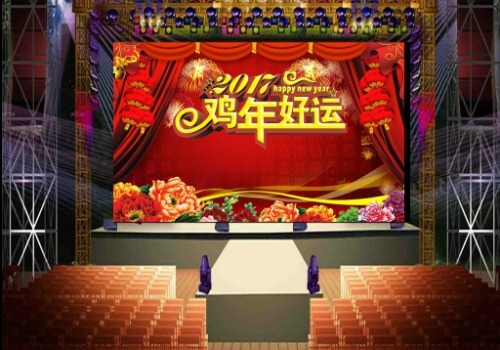
The biggest live television event in the world is about to start. Spring Festival is here and that means it is time for the CCTV New Year’s Gala 2017: the special annual evening variety show that captures millions of viewers on Chinese New Year’s Eve. What’s on Weibo provides you with the ins & outs of the 2017 Gala and its social media frenzy, with updates before, during and after the show. [Premium content]
Are you ready for the Year of the Rooster? Like every year, the start of Chinese New Year is celebrated with Chunwan, the CCTV Spring Festival Night Gala (中国中央电视台春节联欢晚会), better known as CCTV New Year’s Gala.
With an average viewership of 700/800 million, or 90% audience share, the event is the world’s most-watched TV show. The four-hour long spectacle, that starts at 8 pm Chinese time, is a both an entertainment show and propaganda platform – it features China’s biggest stars and best performers while also including the current Party propaganda outlines.
Stay with us to watch the gala and to get to know its ins & outs (also see our liveblog of 2016).
Live stream of the Gala on Youtube and on CCTV Gala official website.
Liveblog (now closed) :
27/01 18:34
Are you ready?
A little over three hours to go before the start of the CCTV Spring Festival Gala (央视春晚), the variety show that will entertain families all over China in the last hours of the Year of the Monkey with an evening full of music and performances. This year is the 35th edition of the Spring Festival Gala, which has been broadcasted since 1983. With a viewership of 700 to 800 million people, is the world’s most-watched TV show – bigger than the Oscars or the Super Bowl.
27/01 19:04
What to expect?
What can we expect at this year’s show? Like last year, the show will be broadcasted from various places besides its main venue in Beijing’s CCTV’s No.1 Studio. In 2016, the Gala was aired from Quanzhou, Xi’an, Guangzhou and Hulun Buir.
This year, it will be aired from Harbin, Guilin, Shanghai and Liangshan. Every city has its own hosts, who often welcome the audiences in their own local dialect or language, with performances that are related to the region. Last year the spectacular performance of singer Sun Nan (孙楠) who danced with 540 moving robots reinforced the image of Guangdong as the home of China’s tech startups.
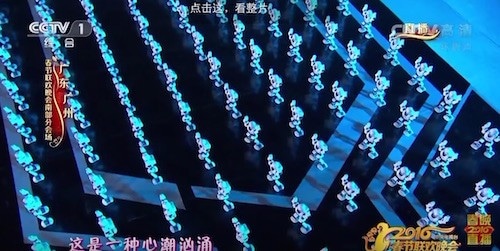
27/01 18:49
The show people love to hate
Just one hour to go! The CCTV Gala will feature a total of 34 different acts tonight, including singing, dancing, and comedy, in a time frame of around 4 hours.
It is a tradition for families to gather around the TV to watch the Gala before the New Year comes at midnight. The Gala usually is as much about entertainment as it is about political propaganda, and it is somewhat of a tradition to comment on the show and complain about it; criticism on the Gala is actually so commonplace that the sentence “there’ll never be a ‘worst’, just ‘worse than last year'” (“央视春晚,没有最烂,只有更烂”) has become a popular saying over the years.
Unsurprisingly, the show also drew much criticism in 2016 when some called the show a “propaganda disaster.” According to many viewers, the spectacle was “way too political” with its display of communist nostalgia, including the performance of different revolutionary songs such as ‘Without the Communist Party, There is No New China’ (没有共产党就没有新中国)… we can probably expect the same complaints on Chinese social media tonight.
27/01 12:31
Tonight’s hosts
This year, the main show of the CCTV Spring Festival Gala will be hosted by familiar faces: the presenters Zhu Jun (朱军), Dong Qing (董卿), Zhu Xun (朱迅) , Kang Hui (康辉) and Nëghmet Raxman.
The 52-year-old Chinese host and actor Zhu Jun is one of the most well-known CCTV faces. He has presented the CCTV New Year Gala since 1997. Dong Qing (43 years old) is also an annual host: she has hosted the Gala since 2005. Zhou Xun is a Chinese actress and singer, who will be on the show for the fifth time. Kang Hui is an influential CCTV news anchor and Nëghmet is a Chinese television host of Uyghur heritage.

Tonight there will be many stars appearing on the show, from kungfu star Jackie Chen to skit actor Pan Changjiang, Olympic star Fu Yuanhui, actress Yan Xuejing, comedian Jiang Kun, and many, many others.
27/01 12:44
The Mascot
It’s almost time to start! In the meantime, a little update on the CCTV mascot. In 2015, the CCTV Gala introduced an annual new mascot for its New Year’s Show. Last year’s mascot Kang Kang drew so much controversy with its unconventional appearance, that CCTV decided to play it safe this year with a traditional Rooster. The rooster will reappear throughout the show in the Gala’s logo. Besides this rooster there is also a more humorous one that appeared in the promotion video of the Gala.
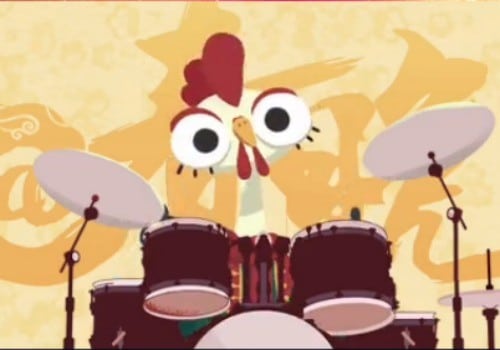
27/01 19:09
Here We Go!
Here we go! This year’s CCTV New Year’s Gala first starts with intertextual references to all the past “hits” of the gala, which has been aired since 1983. This opening act is a much-anticipated one, as the very popular boy group the TFBoys are performing together with beautiful Chinese actresses Liu Tao, Jiang Xin, Wang Ziwen, Yang Zi and Qiao Xin.
They are performing the song “Beautiful China Year” (美丽中国年).
The TFBoys have been very successful in China over the past years. They also appeared at last year’s Gala, and recently won the Weibo Awards for being the most popular on Chinese social media, for which they received nearly 63 million votes. Their performance here tonight might make it more appealing for younger audiences to watch the New Year’s Gala, which generally has a somewhat stuffy image.
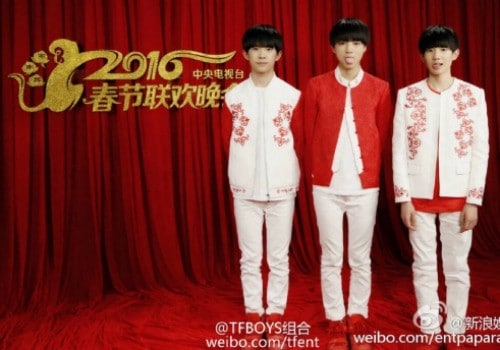
27/01 13:28
Theme: National Unity
Tonight’s hosts have welcomed us to this year’s Spring Gala and are introducing us to the other sub-venues from Harbin to Guilin, from Shanghai to Hong Kong. All the while the various ethnicities of China are emphasized. An important theme of this year (and previous years) is national unity, traditional culture and family affection. Previous year there was a special emphasis on the “Chinese Dream.”
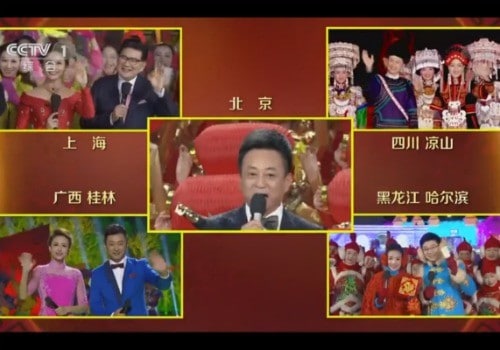
27/01 13:32
First Sketch
During tonight’s show there will be various performances, of which nine will be comical sketches. After we have just witnessed dozens of chickens dancing in a somewhat hysterical performance by the “Air Force BLue Sky Children’s Art Troupe”, it is now time for a comical sketch. These sketches often contain some political messages; previous year there was a special emphasis on corrupt officials.

This sketch called “Big City, Little Love” is performed by Liu Liang, Bai Ge and Guo Jinjie. It is about a young man, a migrant worker, who lied to his wife saying he has gone to work in the city where he had a “high position.” In fact, he is a window cleaner for high buildings.
27/01 13:40
“In This Moment”
This is the older song “In this moment” (在此刻) performed by singers Hu Ge and Wang Kai (胡歌, 王凯). (Watch the show live here https://youtu.be/8Tnna8odMvA).
27/01 13:52
“Older Couple”
This second sketch of tonight has some big stars. Cai Ming (蔡明) is a singer, actress, and sketch performer notable for performing sketch comedy in CCTV New Year’s Gala since 1991 – she is known for her sharp language. Pan Changjiang also is a Chinese skit actor and sitcom actor. In his early years, he appeared regularly in the CCTV New Year’s Gala.
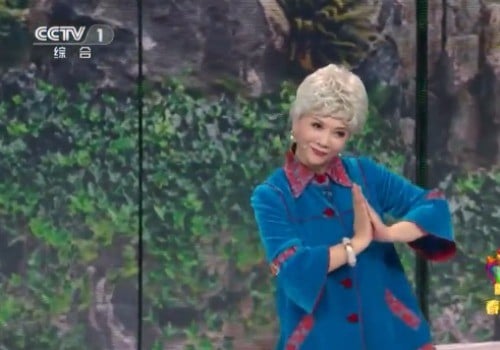
This sketch is called “Older Couple” and is about a man who forgot what his wife looked like until Cai comes along and pretends to be his wife. In the end it turns out that it is not him, but her who lost her memory. When she remembers – in a The Notebook kind of scene – the couple falls into each other’s arms.
27/01 13:59
Over to Liangshan
We are now moving over from Beijing’s studio to the venue in Liangshan (凉山), Sichuan province. We first see the dance ‘fire of celebration’, followed by a song titled “Deep Feelings, Long Friendship” (情深谊长). The Chinese singer performing here is named Jike Junyi or simply ‘Summer’. She is a 28-year-old singer who was born and raised in Liangshan. She is wearing traditional Yizu (彝族) minority clothing and sings about the Long March.
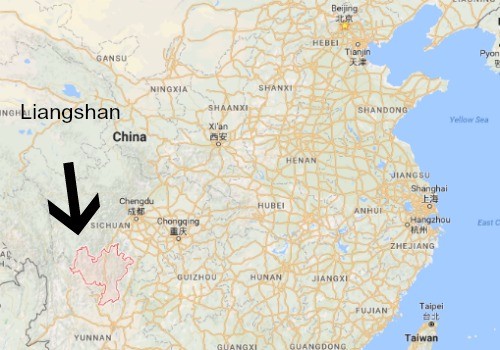
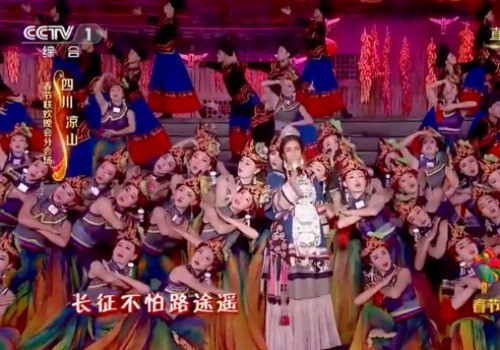
Summer’s performance is followed by a catchy tune by singers Li Keqin and Cai Zuoyan, who sing with some Sichuanese touch to it. The fire torches in the background are also an Yi minority tradition.
27/01 14:11
Crosstalk
We’re back in Beijing for this crosstalk (相声) scene by Gao Xiaopan and You Xiancha (高晓攀、尤宪超). Different from the other sketches (小品), crosstalk usually involves two actors with one being the “joker” and the other being the “teaser”.
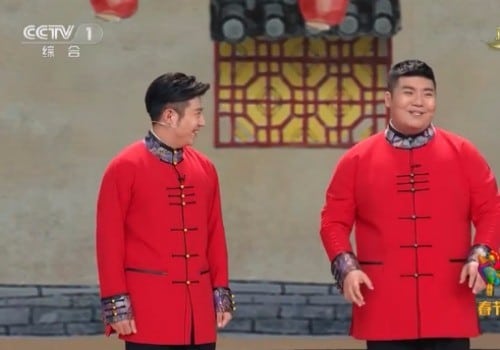
Other than the other sketches, crosstalk is about word jokes and playing with rhythm and language. This particular scene is about two men looking back on their childhood, and the nostalgic things about being brought up by their grandmother. This scene, that represents some sort of collective memory, will be especially appealing to China’s post-1980s generations who were often raised by their grandparents. Apart from national unity and traditional culture, family affection is one of this year’s themes for the Spring Festival Gala. It touches a sensitive nerve for many, as it makes them think back of their own grandmother.
27/01 14:17
Wow, Li Yanchao
The next performance is a pretty stunning underwater-kind-of-scene with Chinese dancer Li Yanchao (李艳超) stealing the show. The female host says: “Let’s express the hope that in the new year, there will be more patches of grass under our feet, and more blue sky above our head.”
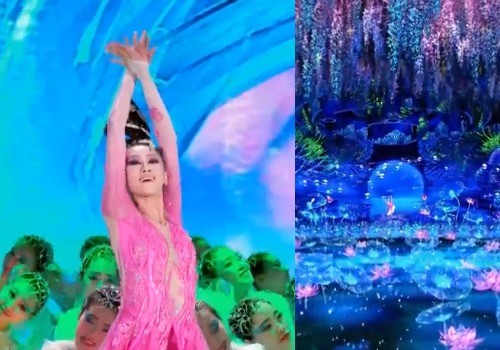
27/01 14:32
The Match-Making Show
This funny sketch imitates one of China’s most popular dating shows If You Are The One 非诚勿扰. They get succesfully matched, but then it turns out that they are actually a divorced couple. This is the 3rd of a total of 6 comical sketches that will be performed tonight.
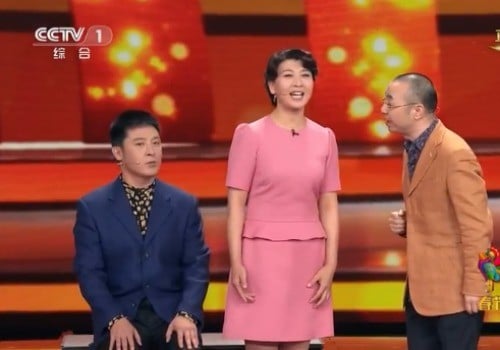
The main conflict of this sketch is that the woman wants her husband’s attention, while he thinks making money is more important than being his wife’s side – a common conflict in middle-aged families in China today. Since tonight’s theme is family affection, the sketch ofcourse has a happy end with both husband and wife expressing their love for each other.
27/01 14:31
Is this show really live?
Is this really live? Yes it is. But although the Gala is a live broadcast from CCTV’s No.1 Studio, and its other venues across China, every year’s show has a taped version of the full dress rehearsal. The tape of the official rehearsal runs together with the live broadcast, so that in the event of a problem or disruption, the producers can seamlessly switch to the taped version without TV audiences noticing anything.
27/01 19:53
Two stars, different generations
Here are are teen idol Jason Zhang (张杰) and Mao Amin, one of China’s most famous and female pop stars of the mid-1990s. You might notice that Mao Amin’s voice is much firmer and fuller than Zhang Jie’s. In Mao Amin’s generation, most singer got popular because of their skills, not for their looks..

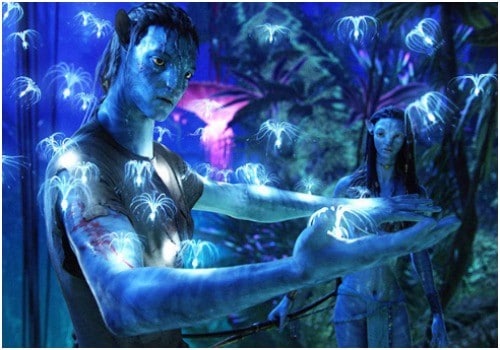
The set of this song is so extravagant and spectacular, that some netizens think that this year’s CCTV gala director, Yang Dongsheng, must be a big fan of Avatar the Movie.
27/01 14:48
Here’s Guilin!
We’re now moving from Beijing to Guilin in Guangxi. The event is performed near Guilin’s famous Elephant Trunk Hill, where various Taiwan and Hongkong singers are invited to sing folk songs. The first song is a well-known traditional Chinese song: the Mountain Song from the famous Chinese movie Third Sister Liu 刘三姐. The scene here seems to include fragments of Zhang Yimou’s Impressions Liu San Jie show.
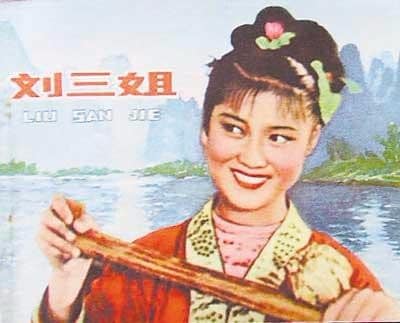
27/01 14:58
Nostalgia
This year’s CCTV Gala is looking back on previous years. This is the 35th year the Gala is broadcasted, and this edition started with a look back on top hits over the past three decades. This sketch also reflects on the past of the Gala, as the actors have previously performed a sketch here in 1987. Its message is that the society today is not the same as the society of 30 years ago. It reflects on how many people are bystanders, and that few people are helping each other out.
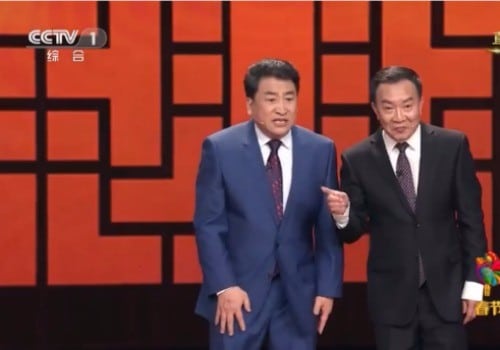
27/01 15:04
Heroes of the Red Army
Time to honour some communist heroes – a recurring part of the CCTV New Year Gala. One of the elderlies honored here is aged 104 was around 22 years old during the Long March.
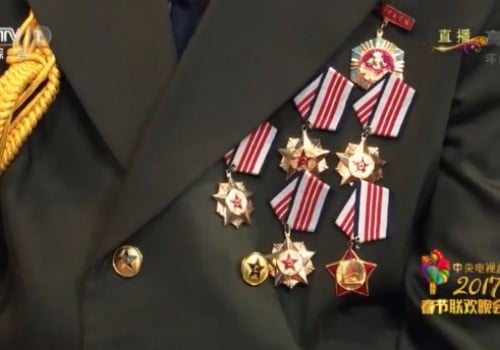
27/01 15:11
Propaganda Platform?
The Communist and military songs of last year’s Gala annoyed many netizens, who thought the Gala was merely a propaganda platform rather than a variety show. But it is a recurring part in virtually every show.
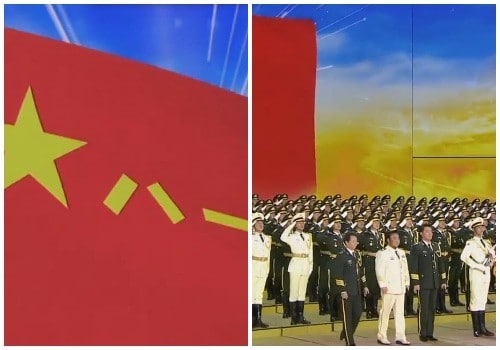
27/01 15:16
Hashtag #CCTVGALA
On Weibo, the views and comments on the hashtag #CCTVGala (#春晚#) have by now exploded, with over 13 billion views and 52 million comments.
One popular post is that from a netizen who tells she was watching the Gala and the TFBoys with her grandma on an old TV set when her grandmother asked: “Is that boy on the left not feeling well?”
27/01 15:22
Family First
It is clear that family affection is one of this year’s main topics, as all sketches revolve around family relations. This sketch deals with the relationship between children and parents in law. Instead of talking about the well-known daughter and mother in law conflicts, it talks about the relations between son and father in law. Although the father does not like his son in law, the young man is really trying to help him either way.

27/01 15:28
90 Minutes to go!
There’s still 90 minutes to go before the New Year! Main themes of the night up to now: national unity (dancing minorities!) and family affection (marriage and family harmony!).
We have already seen Liangshan and Guilin subvenues, and will still see performances from the venues in Shanghai and Harbin in the coming 1,5 hours.
Meanwhile, Weibo netizens are wondering why the actress from a sketch earlier tonight, the renowned Cai Ming, was copying Elsa from Frozen.
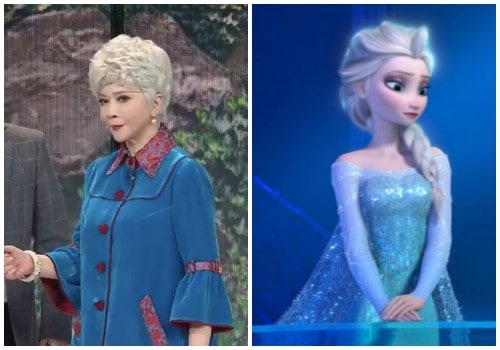
27/01 15:35
Chinese Opera
This is a compilation of songs, such as “One Generation to Another” (薪火相传), by various Chinese Opera performers and troupes.
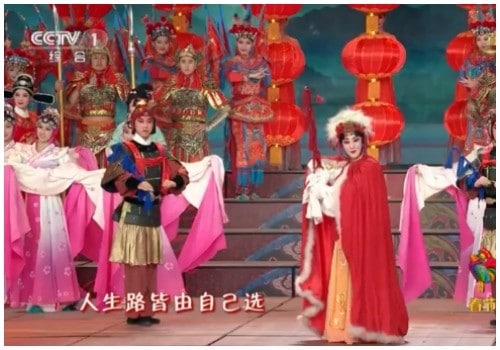
27/01 19:19
Look at China
This song titled “Look at the mountains, look at the water, look at China” (看山看水看中国) by Lu Jihong and Zhang Ye (吕继宏, 张也) is an ode to China’s different landscapes. It is accompanied by a clip that shows different places in China, from the nature in the south to the big cities in the north.
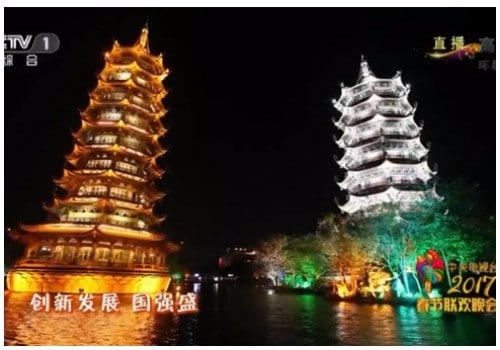
27/01 16:31
Minority Sketch
This sketch called “A Tianshan Situation” (天山情) focuses on the people of the mountainous area on the border between Xinjiang and Mongolia. The act is mostly spoken in north-eastern dialect, with a slight Shanghai dialect. The sketch is about a train track project in their region that has shocked the cows due the noise, affecting their milk production. When all goes well in the narrative, the Uyghur people finally thank the Chinese Han people for saving their life and everything they have done and for saving their lives – perhaps a somewhat controversial angle…
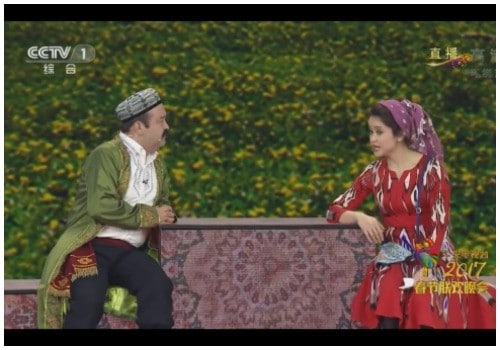
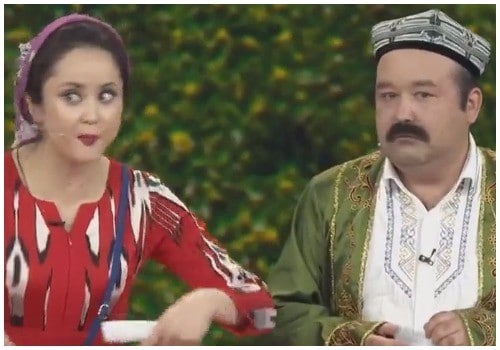
27/01 16:05
Switching to Harbin
One of today’s subvenues is Harbin, in northern province of Heilongjiang, home to the famous Harbin Ice World. The park has dozens of enormous buildings and sculptures completely made from ice. The city is currently about -20 celcius; perfect weather for acrobatics on ice!
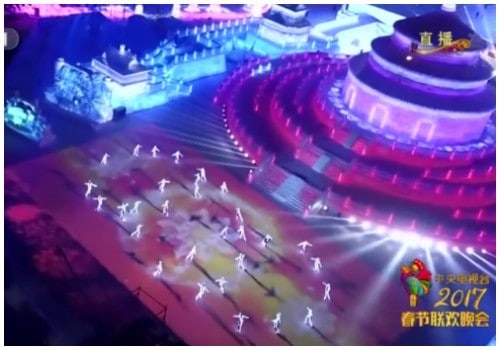
27/01 16:09
These are the Champions
The National Martial Arts team has arrived to the stage. These are all China’s top martial art champions. More than 60 of them, both men and women, are performing together here tonight.
27/01 16:11
Public Announcement
Every year’s CCTV Gala has a “public advertisement” (公益广告) , a movie that is often emblematic of the morals or the guidelines the Party leadership wants to emphasize for the Chinese New Year. With an audience of 700 to 800 people, the show is the perfect propaganda platform.
27/01 19:35
Dancing Pineapples
Yes. We are now watching dancing pineapples and watermelons. Always when you think it cannot get worse, it always does – as many netizens say. This is a song that encourages people to do sports and eat healthy; one of this year’s themes is also to promote good (mental and physical) health.
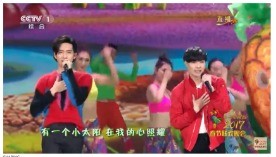
27/01 19:17
Trusting people
In one the night’s last comical sketches called ‘Trust’ (信任), we see famous comedian Lin Yongjian in a narrative about trusting people. On New Year’s Eve, a taxi customer wants to go upstairs to pick something up – but the taxi driver is afraid they will walk off. The customer is also afraid the driver will drive off. It is during this sketch that Olympic swimmer Fu Yuanhui, one of the most popular social media figures of 2016, pops up for a short role. She performs some tongue twisting sentences in Anhui dialect.
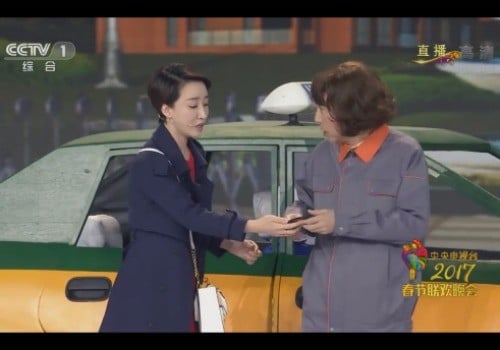
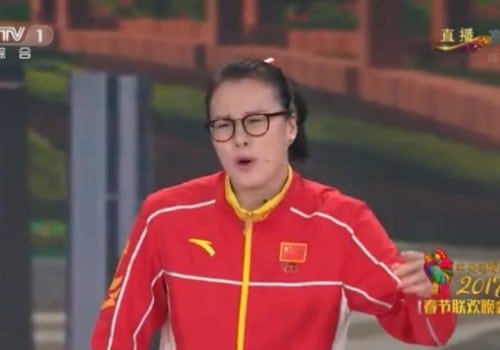
27/01 16:39
Honouring the Astronauts
Time to honour 11 Chinese astronauts.
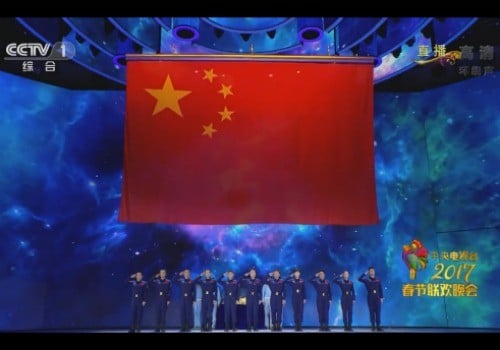
27/01 19:14
Here’s Jackie Chan! But what on earth is he doing?
In this song that is simply titled “Country” (国家), Jackie Chan steps out with students from Peking University to sing about his love for China (“I love my home”) while doing a dance that entails what looks like sign language. Perhaps not really what you would expect the “kungfu master” to do.
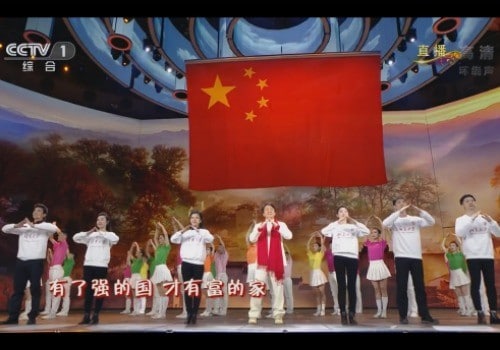
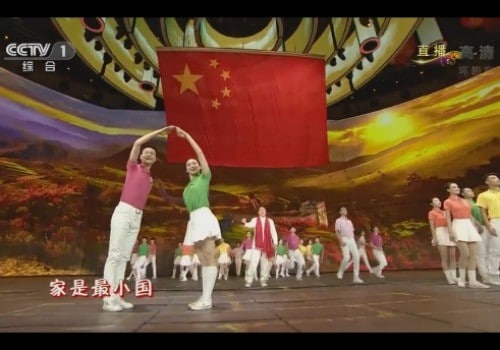
28/01 09:23
Shanghai Dream City
Now over to Shanghai for a song by Chinese singers Coco Lee and JJ Lin about “Dream City” Shanghai. We see a futuristic scene with motors going round in a big metal round set-up in front of the iconic Pearl Tower. It is one of the most spectacular scenes of the night, comparable to that of the dancing robots in 2016.
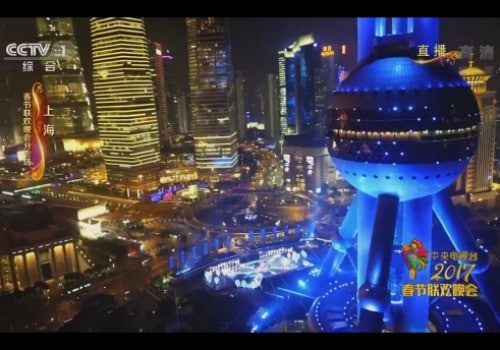
27/01 16:56
Almost time!
It is almost time for the 12 o’clock moment! Just before we will hear a song by singers Han Lei and Tan Weiwei with what looks like a somewhat cringeworthy company of farmers, migrant workers, hospital staff and soldiers to represent “all the Chinese people.”
27/01 17:01
HAPPY NEW YEAR!
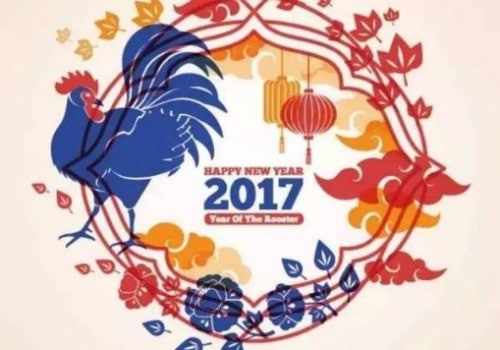
The hosts of tonight’s Gala are wishing everybody a happy Chinese New Year. And of course we at What’s on Weibo are also wishing you a happy Year of the Rooster.
27/01 19:11
“Mother China”
Just immediately after the New Year countdown, here comes a song called “Mother China” (母亲是中华).
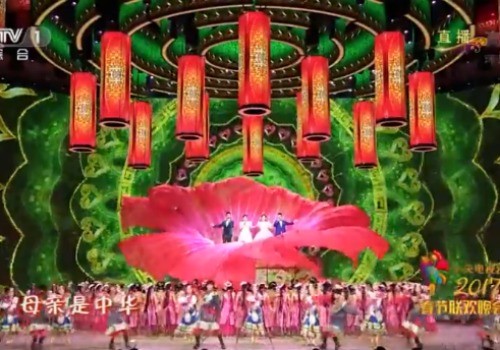
27/01 17:11
Interlude
A little interlude clip shows Chinese abroad singing about the “Chinese feeling” (中国心). The CCTV festival is watched by millions of Chinese within the PRC, but there is also a huge viewership outside of China.
27/01 17:19
The last sketch of the night stresses national unity
The last sketch of the night is a typically southern sketch, set during the peak of the G20 Summit in Hangzhou. The story takes place in a community park, where the four protagonists have a misunderstanding. The narrative focuses on people’s good morals, and is full of Jiangsu and Zhejiang dialect.

This sketch, like the one of the “Tianshan Mountains” and the story of the Uighur herdsmen, again shows the theme of national unity.
27/01 18:16
More Family Love
“Leave the Grasslands” (离别草原) is sung by famous singer Yun Fei and the female singer Yun Duo. It is followed by another short film that stresses family affinity.
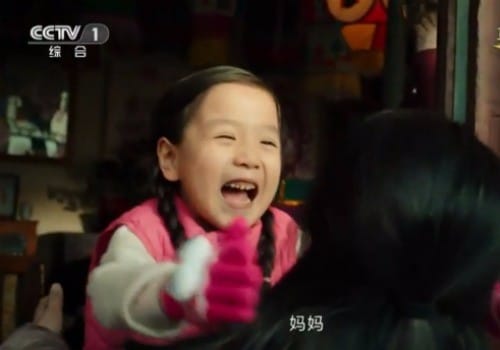
27/01 17:34
“Stop!”
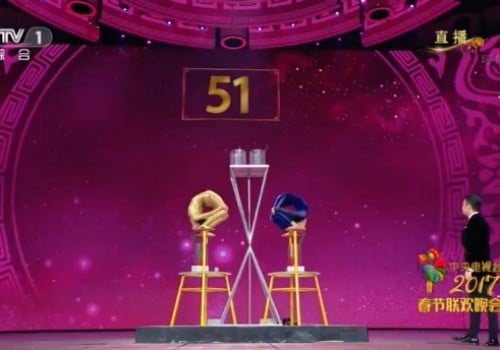
In one of the last acts of the night with a foreign acrobat, the hosts speak some very clearly pronounced English sentences: “Here are the flowers!” and “Stop!” In a game where a Chinese and a foreign acrobat compete to collect as many flowers within 60 seconds, the Chinese woman wins with 16 flowers versus 15 of the foreign acrobat.
27/01 19:13
Dancing Troupe
Chinese singer Wu Tong sings the song “Deep Feelings” (一片深情) accompanied by a group of male dancers.
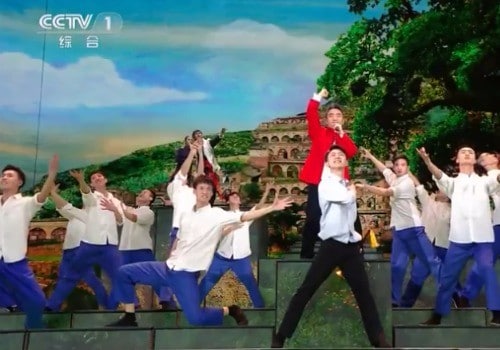
27/01 17:48
Unforgettable Night
The last songs of this night are “Magnificent Journey” (壮丽航程, by Yan Weiwen and Yin Xiumei) and “Unforgettable Night” (难忘今宵). The latter is sung by the 72-year-old singer and dancer Li Guyi and the 64-year-old mezzo-soprano singer Guan Mucun. Li Guyi sings the same song every year at the end of this show.
During these songs, the screen behind the dancers show images of the G20, new glass bridges, windmills, and all kinds of big projects that have been established or organized in China over the past year.
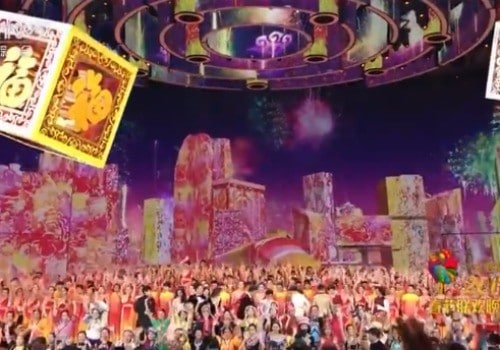
The last song ends with all performers of the Beijing venue on stage. The hosts wish everyone a happy newyear. “See you next year!”, they say.
27/01 19:10
Trending after the Gala: “Brother Smile”
Directly after the ending of the CCTV Gala, many Weibo netizens are talking about one person in the audience as observant viewers have spotted the very same man in the audience of the CCTV Gala every year since 1999. The man, who is now nicknamed ‘CCTV Gala Brother Smile’ (#春晚笑脸哥#), was again spotted in the audience tonight.
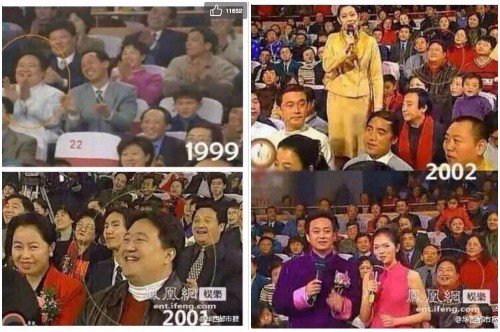
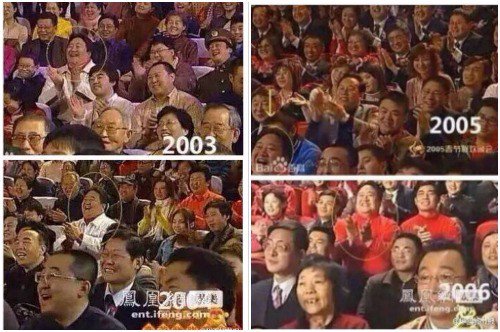
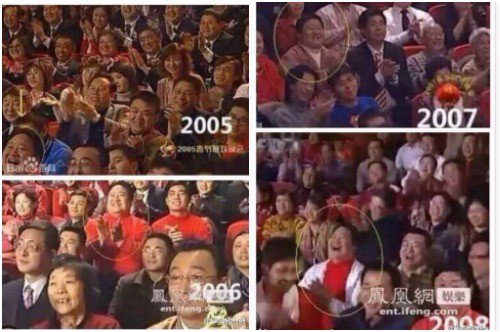
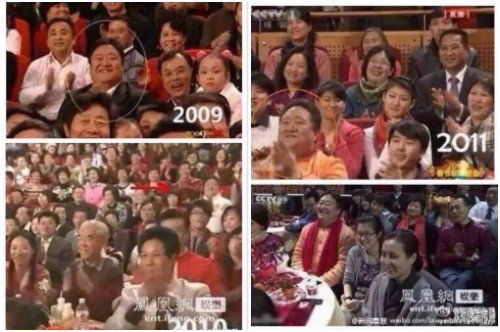
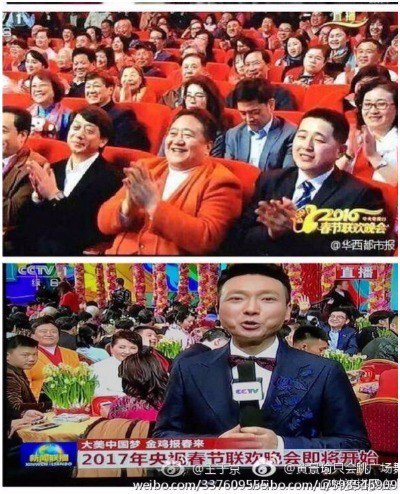
The man has gone viral over Chinese social media now. Many netizens are extremely curious about the man, wondering how he came to sit from the back of the audience to the front crowd throughout the years. Some also compliment him for not having changed much over the past 18 years.
27/01 18:13
That’s a Wrap!
This liveblog will be closing now. We hope you enjoyed the night!
– By Manya Koetse
Follow on Twitter or Like on Facebook
What’s on Weibo is an independent blog. Want to donate? You can do so here.
Sources on Chunwan
Kang, Liu. 2010. “Searching for a New Cultural Identity: China’s soft power and media culture today.” In Suijian Guo and Baogang Guo (eds), Thirty Years of China-U.S. Relations: Analytical Approaches and Contemporary Issues, 197-253. Lanham: Rowman & Littlefield Publishers.
Scocca, Tom. 2011. Beijing Welcomes You: Unveiling the Capital City of the Future. New York: Riverhead Books.
Wang Ge. 2015. “Popular Spring Festival Gala language: Sociocultural Observations.” In Linda Tsung and Wei Wang, Contemporary Chinese Discourse and Social Practice in China, 185-200. Amsterdam/Philadelpia: John Benjamins Publishing Company.
Ying Zhu. 2012. Two Billion Eyes: The Story of China Central Television. New York: The New Press.
©2016 Whatsonweibo. All rights reserved. Do not reproduce our content without permission – you can contact us at info@whatsonweibo.com.
Manya Koetse is the founder and editor-in-chief of whatsonweibo.com. She is a writer, public speaker, and researcher (Sinologist, MPhil) on social trends, digital developments, and new media in an ever-changing China, with a focus on Chinese society, pop culture, and gender issues. She shares her love for hotpot on hotpotambassador.com. Contact at manya@whatsonweibo.com, or follow on Twitter.

China Arts & Entertainment
Singing Competition or Patriotic Fight? Hunan TV’s ‘Singer 2024’ Stirs Nationalistic Sentiments
“I’m in Zibo eating barbecue, I really don’t feel like listening to Alicia Keys.” Hunan TV’s ‘Singer 2024’ has set off a new wave of national pride in China’s music and performers.
Published
2 months agoon
May 17, 2024By
Ruixin Zhang
Besides memes and jokes, Hunan TV’s ‘Singer 2024’ has set off a new wave of national pride in China’s music and performers on Chinese social media.
In May, while the whole of Europe was gripped by the Eurovision Song Contest frenzy, Chinese audiences were eagerly anticipating the return of their own beloved singing competition, Singer 2024 (@湖南卫视歌手), formerly known as I Am a Singer (我是歌手).
The show, introduced from South Korea’s MBC Television and popular in China since 2013, only features professional singers who have already made a name for themselves.
Rather than watching unknown aspiring singers who are hoping to be discovered in many singing competitions, such as Sing! China, Singer 2024 gives audiences a show filled with professional and often stunning show performances by established names in the entertainment industry.
Since 2013, renowned singers from China and abroad have appeared on the show, including Chinese vocalist Tan Jing (谭晶), British pop singer Jessie J, and the late Hong Kong pop diva Coco Lee. However, no season managed to create as many waves as the 2024 season did, dominating all social media trending topics overnight.
So, what exactly happened?
COMPETING WITH FOREIGNERS
“The difference between the Grammys and the Strawberry Musical Festival”
In early May, the pre-show promotion of Singer 2024 was already buzzing on Chinese social media after a list of featured singers appeared on Weibo, including big names such as American singer-songwriter Bruno Mars, Korean-New Zealand singer Rosé from Blackpink, and Japanese diva LiSA.
Although Singer previously had many foreign singers on the show, this international celebrity lineup still caused a stir.
On the day of the first episode, only two foreign singers were announced to appear on the show: young Moroccan-Canadian singer Faouzia and the Grammy-nominated American singer-songwriter Chanté Moore. The other contestants were all Chinese singers who are already well-known among Chinese audiences. Because many people were unfamiliar with the two foreign singers, they joked that the winner of this season was already set in stone; surely it would be the famous Chinese singer Na Ying (那英), known for her beautiful voice.
However, that first episode surprised everyone as the two foreign singers, Faouzia and Chanté Moore, showed outstanding vocal skills. This not only startled many viewers but also made the Chinese contestants uneasy. Several experienced Chinese singers apparently were so unnerved after watching Faouzia and Chanté Moore’s performance that their voices trembled when singing.

Since the show was broadcast live – without post-production editing or autotune – audiences got to hear the actual vocal capabilities and see performers’ genuine reactions. It seemed undeniable that the foreign contestants did much better in terms of vocals and stage presence than the Chinese ones. Some online commenters even said that the gap between Chinese and foreign singers’ levels was like “the difference between the Grammys and the Strawberry Musical Festival” [a local Chinese music festival].
Chinese online influencer Yongkai (@陈咏开165) shared screenshots of Chanté Moore’s backstage reactions during the show. The American celebrity seemed puzzled when hearing the somewhat underwhelming performance by Chinese singer Yang Chenglin (楊丞琳), and she appeared much more positive when Na Ying sang.

This noteworthy scene, coupled with Chanté’s comments during an interview saying that she thought the Chinese production team had invited her on the show to be a judge, turned the entire show into a display of foreign singers outshining the Chinese contestants.
By the end of the first episode, Chanté Moore and Faouzia unsurprisingly ranked first and second, with Na Ying in third place.

After the show, some online commenters jokingly pointed out that Na Ying, being of Manchu descent like the rulers of China during the Qing Dynasty, showed some similarities to Empress Dowager Cixi’s defiance against Western colonizers in the way she “single-handedly took up against on foreigners” on the show.
They humorously turned Na Ying’s expressions into memes resembling Empress Dowager Cixi from an old Chinese TV show, with captions like “I want the foreigners dead” (“我要洋人死”).

Others suggested finding better Chinese singers for the show who could compete with Faouzia and Moore.
“SINGING WELL” CULTURALLY COLONIZED?
“I’m in Zibo eating BBQ, I really don’t want to listen to Alicia Keys.”
Initially, discussions about the show were light-hearted and humorous, until some netizens who couldn’t appreciate the jokes began to dampen the mood and made online discussions more serious.
Zou Xiaoying (@邹小樱), a music critic with nearly two million followers, posted on social media after the show, stating that he would have never voted for Chanté Moore or Faouzia. Not only did Zou question their vocal talent, he also wondered if the aesthetic of Chinese listeners had been influenced by Western music taste to such an extent that it has been “culturally colonized” (“文化殖民”). Meanwhile, he praised the members of Beijing rock band Second Hand Rose as “national heroes” (“民族英雄”).
He wrote:
If I had three votes for the first episode of “Singer 2024,” I’d vote for Second Hand Rose, Na Ying, and Silence Wang [note: Chinese singer-songwriter and record producer Wang Sushuang 汪苏泷]. The reason I wouldn’t vote for Chanté Moore or Faouzia is because — do they actually sing so well?
Has our definition of “singing well” perhaps been colonized? Just as our modern-day use of Chinese has little to do with our classical Chinese poems, with the foundation of modern Chinese actually being translations from the 20th century, is this also a form of ‘cultural colonization’?
You must think I’m talking nonsense again. But when I listen to Chanté Moore singing “If I Ain’t Got You,” I find it too boring. I know her singing is “good,” but this “good” has nothing to do with me. If, for Chinese listeners, Chanté Moore’s “good” is the standard, then is that what we in the music industry should be working towards? Isn’t that funny? When you open QQ Music or NetEase Cloud Music, and it recommends these songs to you every day, won’t you be convinced to practice again?
Of course, I know Chanté Moore is in good shape, very relaxed. Actually all of the Chinese singers tonight were very nervous. Yang Chenglin (杨丞琳) was nervous, Na Ying was also nervous. Even a seemingly carefree band like Second Hand Rose, if you listened to the introduction of their song, [you’ll find] they were so nervous that Yao Lan, supposedly “China’s No.1 Guitarist”, was so nervous that he hit the wrong note. It was not even a fast-paced solo (…), how nervous could he be? When everyone’s so tense, the confidence of Chanté Moore and Faouzia is indeed something that East Asia can’t match. In East-Asian [entertainment] circles, represented by China/Japan/Korea, our different cultural habits, upbringing, and ethnic characteristics have made it so that we don’t possess these kinds of singing abilities, even including our ways of emotional expression. I don’t know from which season it started with ‘Singer’ – and if it’s some kind of Catfish Effect (鲶鱼效应 ) – that they brought international singers with different cultural backgrounds into the competition. But this isn’t the Olympics, it’s not like Liu Xiang [刘翔, Chinese gold medal hurdler] is going to defeat opponents from the United States or Cuba. “I’m in Zibo eating barbecue, I really don’t feel like Alicia Keys.” (This line is not mine, I stole it from my WeChat friend).
Because of this, I find Second Hand Rose even more rare and precious. It’s just like I used to love asking: If you could only recommend one Chinese band to your foreign friends, which one would you recommend? Some say it’s New Pants (新裤子), some say it’s Omnipotent Youth Society, but my answer will always be Second Hand Rose. ‘The drama of Monkey King is a national treasure,’ its light will always shine. Facing the gunfire of Western powers, Second Hand Rose is standing on the frontline, they are our national heroes. Indeed, the band itself was nervous, (..), but when Chanté Moore goes off like a singing dolphin, we are fortunate to have Second Hand Rose at the frontline; the Chinese sons and daughters are building the Great Wall of Music of flesh and blood.
Because of this, I find Second Hand Rose even more rare and precious. It’s just like I used to love asking: If you could only recommend one Chinese band to your foreign friends, which one would you recommend? Some say it’s New Pants (新裤子), some say it’s Omnipotent Youth Society, but my answer will always be Second Hand Rose. ‘The drama of Monkey King is a national treasure,’ its light will always shine. Facing the gunfire of Western powers, Second Hand Rose is standing on the frontline, they are our national heroes. Indeed, the band itself was nervous, (..), but when Chanté Moore goes off like a singing dolphin, we are fortunate to have Second Hand Rose at the frontline; the Chinese sons and daughters are building the Great Wall of Music of flesh and blood.
Anyway, no matter if they’re strong or not, I would never vote for the foreigner.
The comment about ‘I’m in Zibo eating barbecue, I really don’t feel like [listening to] Alicia Keys’ refers to the craze surrounding China’s ‘BBQ town’ Zibo. In Zibo, Chinese visitors like to sing, drink beer, and enjoy food together; it’s a simple and modest way of appreciating life and music, which contrasts with slick and smooth American or foreign styles of performing and singing.
Whether Zou’s criticism was for attention or genuine sentiment, it shifted the focus of the discussion from music to patriotism.
CHINESE SINGERS WITH MILITARISTIC UNDERTONES
“I volunteer to join the battle”
Amidst all this, some netizens, easily swayed by nationalist sentiments, began to seek help from the “national team” (国家队) of singers — musicians employed by national-level arts troupes — to “bring glory to the nation” and teach the foreigners a lesson. Some even questioned the intentions of the Singer 2024 TV show in inviting foreign singers to participate.
On May 12th, renowned Chinese singer and philanthropist Han Hong (韩红) posted on Weibo, fueling a wave of sentiment and support. In her post, Han Hong declared, “I am Chinese singer Han Hong, and I volunteer to join the battle,” tagging the production team of the TV show. Her invitation to join the battle quickly went viral.

Han Hong meme: “Who called for me?”
Han Hong has significant influence in the Chinese music industry and society as a whole. Her usual serious demeanor and avoidance of internet pop culture made netizens unsure whether she was joking or serious. Nevertheless, regardless of her intentions, a group of well-known singers began to volunteer via Weibo, emphasizing their identity as “Chinese singers” and using phrases with strong militaristic undertones like “fighting for the country” and “answering the call.”
Although many enjoyed this new wave of national pride in Chinese music and performers, some netizens criticized the trend of transforming an entertainment show into a nationalistic competition.
Film critic He Xiaoqin (何小沁) stated, “It’s okay to take the Qing-Dynasty-fighting-foreigners comparison as a joke, but taking it too seriously in today’s context is absurd.”
Others expressed fatigue with how quickly topics on Chinese internet platforms escalate to patriotic sentiments. To bring the focus back to entertainment, they turned “I volunteer to join the battle” (#我请战#) into a new internet catchphrase.
In response, the production team of Singer 2024 released a statement on Weibo, thanking all the singers for their self-recommendations. They emphasized the show’s competitive structure but clarified that “winning” is just one part of a singer’s journey..but that the love of music goes beyond all in connecting people, no matter where they’re from.
By Ruixin Zhang, edited with further input by Manya Koetse
Independently reporting China trends for over a decade. Like what we do? Support us and get the story behind the hashtag by subscribing:
Spotted a mistake or want to add something? Please let us know in comments below or email us. First-time commenters, please be patient – we will have to manually approve your comment before it appears.
©2024 Whatsonweibo. All rights reserved. Do not reproduce our content without permission – you can contact us at info@whatsonweibo.com.
China Arts & Entertainment
“Old Bull Eating Young Grass”: 86-Year-Old Chinese Painter Fan Zeng Marries 36-Year-Old Xu Meng
Online reactions to the news of Fan’s marriage to Xu Meng, his fourth wife, reveal that the renowned artist is not particularly well-liked among Chinese netizens.
Published
3 months agoon
April 18, 2024
The recent marriage announcement of the renowned Chinese calligrapher/painter Fan Zeng and Xu Meng, a Beijing TV presenter 50 years his junior, has sparked online discussions about the life and work of the esteemed Chinese artist. Some netizens think Fan lacks the integrity expected of a Chinese scholar-artist.
Recently, the marriage of a 86-year-old Chinese painter to his bride, who is half a century younger, has stirred conversations on Chinese social media.
The story revolves around renowned Chinese artist, calligrapher, and scholar Fan Zeng (范曾, 1938) and his new spouse, Xu Meng (徐萌, 1988). On April 10, Fan announced their marriage through an online post accompanied by a picture.
In the picture, Fan is seen working on his announcement in calligraphic form.

Fan Zeng announces his marriage on Chinese social media.
In his writing, Zeng shares that the passing of his late wife, three years ago, left him heartbroken, and a minor stroke also hindered his work. He expresses gratitude for Xu Meng’s care, which he says led to his physical and mental recovery. Zeng concludes by expressing hope for “everlasting harmony” in their marriage.
Fan Zeng is a calligrapher and poet, but he is primarily recognized as a contemporary master of traditional Chinese painting. Growing up in a well-known literary family, his journey in art began at a young age. Fan studied under renowned mentors at the Academy of Fine Arts in Beijing, including Wu Zuoren, Li Keran, Jiang Zhaohe, and Li Kuchan.
Fan gained global acclaim for his simple yet vibrant painting style. He resided in France, showcased his work in numerous exhibitions worldwide, and his pieces were auctioned at Sotheby’s and Christie’s in the 1980s.[1] One of Fan’s works, depicting spirit guardian Zhong Kui (钟馗), was sold for over 6 million yuan (828,000 USD).

Zhong Kui in works by Fan Zeng.
In his later years, Fan Zeng transitioned to academia, serving as a lecturer at Nankai University in Tianjin. At the age of 63, he assumed the role of head of the Nankai University Museum of Antiquities, as well as holding various other positions from doctoral supervisor to honorary dean.
By now, Fan’s work has already become part of China’s twentieth-century art history. Renowned contemporary scholar Qian Zhongshu once remarked that Fan “excelled all in artistic quality, painting people beyond mere physicality.”
A questionable “role model”
Fan’s third wife passed away in 2021. Later, he got to know Xu Meng, a presenter at China Traffic Broadcasting. Allegedly, shortly after they met, he gifted her a Ferrari, sparking the beginning of their relationship.

A photo of Xu and her Hermes Birkin 25 bag has also been making the rounds on social media, fueling rumors that she is only in it for the money (the bag costs more than 180,000 yuan / nearly 25,000 USD).
On Weibo, reactions to the news of Fan’s marriage to Xu Meng, his fourth wife, reveal that the renowned artist is not particularly well-liked among netizens. Despite Fan’s reputation as a prominent philanthropist, many perceive his recent marriage as yet another instance of his lack of integrity and shamelessness.

Fan Zeng and Xu Meng. Image via Weibo.
One popular blogger (@好时代见证记录者) sarcastically wrote:
“Warm congratulations to the 86-year-old renowned contemporary erudite scholar and famous calligrapher Fan Zeng, born in 1938, on his marriage to Ms Xu Meng, a 50 years younger 175cm tall woman who is claimed to be China’s number one golden ratio beauty. Mr Fan Zeng really is a role model for us middle-aged greasy men, as it makes us feel much less uncomfortable when we’re pursuing post-90s youngsters as girlfriends and gives us an extra shield! Because if contemporary Confucian scholars [like yourself] are doing this, then we, as the inheritors of Confucian culture, can surely do the same!“
Various people criticize the fact that Xu Meng is essentially just an aide to Fan, as she can often be seen helping him during his work. One commenter wrote: “Couldn’t he have just hired an assistant? There’s no need to turn them into a bed partner.”
Others think it’s strange for a supposedly scholarly man to be so superficial: “He just wants her for her body. And she just wants him for his inheritance.”
“It’s so inappropriate,” others wrote, labeling Fan as “an old bull grazing on young grass” (lǎoniú chī nèncǎo 老牛吃嫩草).
Fan is not the only well-known Chinese scholar to ‘graze on young grass.’ The famous Chinese theoretical physicist Yang Zhenning (杨振宁, 1922), now 101 years old, also shares a 48-year age gap with his wife Weng Fen (翁帆). Fan, who is a friend of Yang’s, previously praised the love between Yang and Weng, suggesting that she kept him youthful.

Older photo posted on social media, showing Fan attending the wedding ceremony of Yang Zhenning and his 48-year-younger partner Weng Fen.
Some speculate that Fan took inspiration from Yang in marrying a significantly younger woman. Others view him as hypocritical, given his expressions of heartbreak over his previous wife’s passing, and how there’s only one true love in his lifetime, only to remarry a few years later.
Many commenters argue that Fan Zeng’s conduct doesn’t align with that of a “true Confucian scholar,” suggesting that he’s undeserving of the praise he receives.
“Mr. Wang from next door”
In online discussions surrounding Fan Zeng’s recent marriage, more reasons emerge as to why people dislike him.
Many netizens perceive him as more of a money-driven businessman rather than an idealistic artist. They label him as arrogant, critique his work, and question why his pieces sell for so much money. Some even allege that the only reason he created a calligraphy painting of his marriage announcement is to profit from it.
Others cast doubt on his status as a Chinese calligraphy ‘grandmaster,’ noting that his calligraphy style is not particularly impressive and may contain typos or errors. His wedding announcement calligraphy appears to blend traditional and simplified characters.

Netizens have pointed out what looks like errors or typos in Fan’s calligraphy.
Another source of dislike stems from his history of disloyalty and his feud with another prominent Chinese painter, Huang Yongyu (黄永玉). Huang, who passed away in 2023, targeted Fan Zeng in some of his satirical paintings, including one titled “When Others Curse Me, I Also Curse Others” (“人骂我,我亦骂人”). He also painted a parrot, meant to mock Fan Zeng’s unoriginality.

Huang Yongyu made various works targeting Fan Zeng.
In retaliation, Fan produced his own works mocking Huang, sparking an infamous rivalry in the Chinese art world. The two allegedly almost had a physical fight when they ran into each other at the Beijing Hotel.

Fan Zeng mocked Huang Yongyu in some of his works.
Fan and Huang were once on good terms though, with Fan studying under Huang at the Central Academy of Fine Arts in Beijing. Through Huang, Fan was introduced to the renowned Chinese novelist Shen Congwen (沈从文, 1902-1988), Huang’s first cousin and lifelong friend. As Shen guided Fan in his studies and connected him with influential figures in China’s cultural circles, their relationship flourished.
However, during the Cultural Revolution, when Shen was accused of being a ‘reactionary,’ Fan Zeng turned against him, even going as far as creating big-character posters to criticize his former mentor.[2] This betrayal not only severed the bond between Shen and Fan but also ended Fan’s friendship with Huang, and it is still remembered by people today.
Fan Zeng’s behavior towards another former mentor, the renowned painter Li Kuchan (李苦禪, 1899-1983), was also controversial. Once Fan gained fame, he made it clear that he no longer respected Li as his teacher. Li later referred to Fan as “a wolf in sheep’s clothes,” and apparently never forgave him. Although the exact details of their falling out remain unclear, some blame Fan for exploiting Li to further his own career.
There are also some online commenters who call Fan Zeng a “Mr Wang from next door” (隔壁老王), a term jokingly used to refer to the untrustworthy neighbor who sleeps with one’s wife. This is mostly because of the history of how Fan Zeng met his third wife.
Fan’s first wife was the Chinese female calligrapher Lin Xiu (林岫), who came from a wealthy family. During this marriage, Fan did not have to worry about money and focused on his artistic endeavours. The two had a son, but the marriage ended in divorce after a decade. Fan’s second wife was fellow painter Bian Biaohua (边宝华), with whom he had a daughter. It seems that Bian loved Fan much more than he loved her.
It is how he met his third wife that remains controversial to this day. Nan Li (楠莉), formerly named Zhang Guiyun (张桂云), was married to performer Xu Zunde (须遵德). Xu was a close friend of Fan, and helped him out when Fan was still poor and trying to get by while living in Beijing’s old city center.
Wanting to support Fan’s artistic talent, Xu let Fan Zeng stay over, supported him financially, and would invite him for meals. Little did he know that while Xu was away to work, Fan enjoyed much more than meals alone; Fan and Xu’s wife engaged in a secret decade-long affair.
When the affair was finally exposed, Xu Zunde divorced his wife. Still, they would use his house to meet and often locked him out. Three years later, Nan Li officially married Fan Zeng. Xu not only lost his wife and friend but also ended up finding his house emptied, his two sons now bearing Fan’s surname.
When Nan Li passed away in 2021, Fan Zeng published an obituary that garnered criticism. Some felt that the entire text was actually more about praising himself than focusing on the life and character of his late wife, with whom he had been married for forty years.

Fan Zeng and his four wives
An ‘old pervert’, a ‘traitor’, a ‘disgrace’—there are a lot of opinions circulating about Fan that have come up this week.
Despite the negativity, a handful of individuals maintain a positive outlook. A former colleague of Xu Meng writes: “If they genuinely like each other, age shouldn’t matter. Here’s to wishing them a joyful marriage.”
By Manya Koetse
[1]Song, Yuwu. 2014. Biographical Dictionary of the People’s Republic of China. United Kingdom: McFarland & Company, 76.
[2]Xu, Jilin. 2024. “Xu Jilin: Are Shen Congwen’s Tears Related to Fan Zeng?” 许纪霖:沈从文的泪与范曾有关系吗? The Paper, April 15. https://www.thepaper.cn/newsDetail_forward_27011031. Accessed April 17, 2024.
Independently reporting China trends for over a decade. Like what we do? Support us and get the story behind the hashtag by subscribing:
Spotted a mistake or want to add something? Please let us know in comments below or email us. First-time commenters, please be patient – we will have to manually approve your comment before it appears.
©2024 Whatsonweibo. All rights reserved. Do not reproduce our content without permission – you can contact us at info@whatsonweibo.com.
Subscribe

Weibo Watch: The Future is Here

“Bye Bye Biden”: Biden’s Many Nicknames in Chinese

Enjoying the ‘Sea’ in Beijing’s Ditan Park

A Triumph for “Comrade Trump”: Chinese Social Media Reactions to Trump Rally Shooting

Weibo Watch: Get Up, Stand Up

The Tragic Story of “Fat Cat”: How a Chinese Gamer’s Suicide Went Viral

“Old Bull Eating Young Grass”: 86-Year-Old Chinese Painter Fan Zeng Marries 36-Year-Old Xu Meng

A Brew of Controversy: Lu Xun and LELECHA’s ‘Smoky’ Oolong Tea

Singing Competition or Patriotic Fight? Hunan TV’s ‘Singer 2024’ Stirs Nationalistic Sentiments

Zara Dress Goes Viral in China for Resemblance to Haidilao Apron

Weibo Watch: The Battle for the Bottom Bed

About the “AI Chatbot Based on Xi Jinping” Story

China’s Intensified Social Media Propaganda: “Taiwan Must Return to Motherland”

Weibo Watch: Telling China’s Stories Wrong

Saying Goodbye to “Uncle Wang”: Wang Wenbin Becomes Chinese Ambassador to Cambodia
Get in touch
Would you like to become a contributor, or do you have any tips or suggestions? Get in touch here!
Popular Reads
-

 China Insight3 months ago
China Insight3 months agoThe Tragic Story of “Fat Cat”: How a Chinese Gamer’s Suicide Went Viral
-

 China Music4 months ago
China Music4 months agoThe Chinese Viral TikTok Song Explained (No, It’s Not About Samsung)
-

 China Digital10 months ago
China Digital10 months agoToo Sexy for Weibo? Online Discussions on the Concept of ‘Cābiān’
-

 China Arts & Entertainment12 months ago
China Arts & Entertainment12 months agoBehind 8 Billion Streams: Who is Dao Lang Cursing in the Chinese Hit Song ‘Luocha Kingdom’?








André Schappo
January 28, 2017 at 1:18 am
Actually, 难忘今宵 is growing on me and it is only the second year I have watched the CCTV New Year’s Gala????